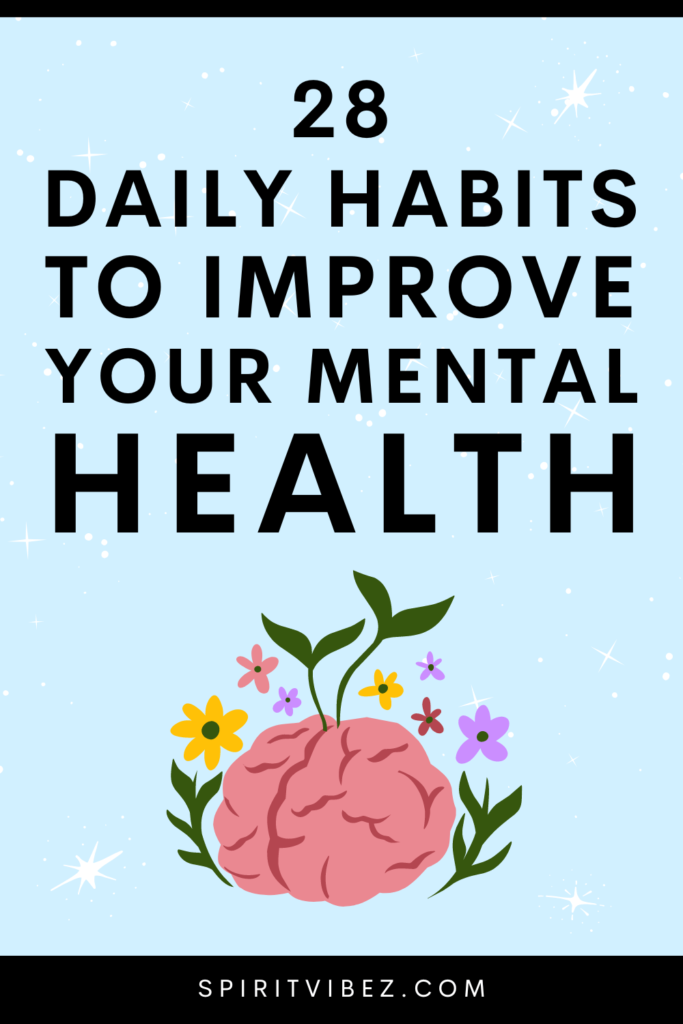Last Updated on December 6, 2023

In the big picture of feeling good, taking care of our minds is super important. Just like how we need to do things to stay physically healthy, there are things we can do to make our minds healthier too.
Life can be tough and stressful, so it’s a good idea to learn about habits that can help us handle things better, feel more balanced, and have a happier life.
This journey to feeling better mentally involves doing certain things regularly, creating a positive space around us, and connecting with people who support us.
In this article, you’ll learn all about how to be mentally healthy and happy with 28 daily habits to improve your mental health!
What habits can improve mental health?
What you do every day has a big impact on your mental health, and incorporating certain practices into your daily routine can help improve your mental well-being.
Below you’ll find 28 daily habits to improve mental health. Try to incorporate as many mental habits as possible into your daily life for the best results:
1. Exercise
Regular physical activity has been shown to improve mood and reduce symptoms of anxiety and depression. Aim to get at least 30 minutes of moderate-intensity exercise, such as brisk walking or cycling, on most days of the week.
2. Sleep
Getting enough sleep is essential for maintaining good mental health. A lack of sleep can cause irritability, moodiness, and difficulty concentrating.
Try to get seven to eight hours of sleep each night and maintain a consistent sleep schedule.
3. Eat a healthy diet
Changing my diet is the one thing I did that improved my mental health the most!
Eating a diet that is high in plant-based whole foods, including fruits, vegetables, legumes, nuts and seeds, while avoiding processed foods and sugar can truly help improve mood and energy levels. Avoid skipping meals, as this can cause irritability and low mood.
4. Practice mindfulness
Mindfulness practices, such as meditation and yoga, have been shown to improve mood and reduce symptoms of anxiety and depression.
Try incorporating mindfulness into your daily routine by setting aside a few minutes each day to practice deep breathing exercises or guided meditations.
5. Connect with others
Strong social connections are important for our mental well-being. Make time to connect with friends and family, and consider joining a group or club that interests you.
6. Avoid drugs and alcohol
Substance abuse can cause or exacerbate mental health problems, as well as interfere with treatment. If you’re struggling with addiction, you should seek professional help.
7. Express yourself
Writing, drawing, painting, or other form of expression, can help to process and understand emotions. Consider journaling, writing poetry or fictional stories, or creating art as a way of exploring your thoughts and feelings.
8. Keep learning
Learning new things, whether it can be reading, taking classes, or pursuing a hobby, can help improve mood and reduce stress. Challenge your brain regularly, and you will notice positive changes!
9. Get professional help
If you’re struggling with a mental health issue, don’t be afraid to reach out for help. Consult a mental health professional, such as a therapist or counselor, who can provide you with the support and guidance you need.
10. Take breaks
It’s crucial to take breaks during the day to rest and recharge. Step away from work or other obligations for a few minutes and do something that makes you feel calm and relaxed, such as taking a walk or reading a book.
11. Prioritize self-care
Self-care is the practice of taking care of your physical, emotional, and mental well-being. Prioritize activities that make you feel good, such as dancing, drinking enough water, and cooking healthy food for you to eat.
12. Practice gratitude
Incorporating gratitude into your daily routine can improve your overall mood and sense of well-being. Keep a gratitude journal, and make a habit of listing things that you’re thankful for each day.
13. Get sunlight
Sunlight exposure can help improve mood and boost energy levels. Try to spend some time outside each day, even if it’s just for a few minutes.
14. Practice forgiveness
Holding onto resentment and anger can take a toll on mental health. Practice forgiveness and let go of negative feelings towards others and yourself.
Often we are our own harshest critics, so be kind and practice forgiveness to yourself as well. Remember that you are doing your best and have a right to make mistakes!
15. Set boundaries
Setting boundaries with others is crucial for maintaining good mental health. Learn to say no to things that are not good for you and learn to assert yourself.
16. Manage stress
Stress is an inevitable part of life, but it’s essential to learn how to manage it healthily. Try different stress-management techniques, such as deep breathing exercises or yoga.
17. Take responsibility
Taking responsibility for your actions and reactions can help improve mental health. Take ownership of your behavior, and learn to accept when you’ve made a mistake and strive to make it right
18. Reflect on your day
Reflecting on the day’s events can help you process your feelings and gain insight into your thoughts and behaviors.
19. Keep your environment organized
A tidy and organized environment can help to reduce stress and improve mood. Take a few minutes each day to tidy up and straighten things.
20. Plan your day
Having a plan for the day can help reduce stress and increase a sense of control. Make a to-do list or schedule for the day ahead.
21. Do something creative
Engaging in creative activities, such as painting, writing, or playing music, can be a great way to express yourself and reduce stress.
22. Practice yoga
Yoga has truly improved my life in many different areas, including my mental health!
It offers a holistic approach to better mental health through its mix of physical postures, breathing exercises, and meditation. By promoting relaxation, stress reduction, and self-awareness, yoga can help manage your anxiety, improve your mood, and foster a better mind-body connection.
23. Try a new activity
Trying something new, like a new hobby or learning a new skill, can be a great way to boost self-esteem and improve mental well-being.
24. Laugh
Laughter is the best medicine, and incorporating humor into your daily routine can help improve mood and reduce stress.
Watch a funny video, read a funny book, or spend time with friends who make you laugh.
25. Take time to unplug
Spending too much time on your phone or computer can be overwhelming and cause feelings of stress and anxiety. Set aside time each day to unplug and disconnect from technology.
26. Cultivate a growth mindset
Developing a growth mindset can positively impact your mental health. Embrace challenges as opportunities to learn and grow, and see failures as stepping stones toward improvement.
27. Practice aromatherapy
Aromatherapy can be a great way to relax and reduce stress. Try burning scented candles, essential oils like lavender, or using aromatherapy sprays.
28. Keep a journal
Keeping a journal can be a great way to process your thoughts and feelings. Write about what’s going on in your life, and reflect on your experiences.
Check out these powerful journal prompts to help you get started:
- Journal prompts to grow spiritually
- Journal prompts to heal your inner child
- Journal prompts for when you feel stuck in life
- Journal prompts for gratitude
- Journal prompts to find your purpose
It’s important to keep in mind that everyone is different and what works for one person may not work for another.
It’s also essential to consult a professional if you have a history of mental health concerns, or if you’re experiencing symptoms that are impacting your daily life.
If you enjoyed this post with daily habits and fun activities to improve mental health, I would be grateful if you shared it on Twitter, Facebook, or Pinterest! Thank you❤️
📌 PIN THIS POST FOR LATER


Hello, my name is Sara and I am the founder of Spiritvibez, I’m here to guide you on your spiritual journey toward healing, growth, and self-discovery. I believe that true transformation occurs when the mind, body, and spirit are aligned and working in harmony. Through Spiritvibez, I hope to inspire and empower you to deepen your spiritual practice, embrace your authentic self, and begin living your best life.
